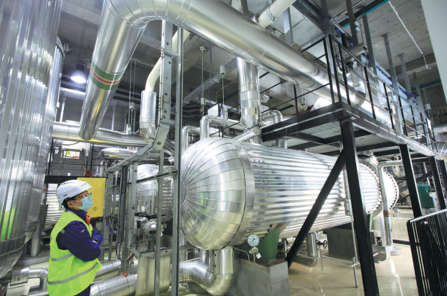Nuclear to play more significant role within renewable power mix
Nuclear power should play a more prominent role in achieving the nation's carbon neutrality goals by more applications in energy-intensive sectors, while also serving as a fundamental power source in the large-scale development of clean energy, said a political adviser on the sidelines of this year's two sessions.
Lu Tiezhong, assistant general manager of China National Nuclear Corp and a member of 14th National Committee of the Chinese People's Political Consultative Conference, called for boosting the utilization of nuclear power in more energy-intensive sectors, from petrochemicals to steel, as well as heating, seawater desalination and isotope production, as China goes full throttle into its green energy transition.
High-temperature gas-cooled reactors, for example — with high inherent safety levels and steam parameters — can provide integrated energy solutions for industrial steam, hydrogen and electricity used in multiple industries, Lu said.
One high-temperature gas-cooled reactor can provide 3,600 metric tons of high-temperature steam per hour. When matched with thermal-chemical hydrogen production plants, it can help reduce emissions of 3.42 million tons of carbon dioxide compared with a traditional thermal power unit. It can also be equipped with petrochemical as well as other industrial processes for higher-quality development, he added.
An analyst said the application of nuclear energy for heating, steam and power supply is the preferred solution to allow the petrochemical industry to face the dual challenges of ensuring stable supply as well as carrying out clean and low-carbon transformation.
Nuclear power is a more stable and reliable type of clean energy compared with solar and wind power, which can be intermittent due to changing weather conditions, said Lin Boqiang, head of the China Institute for Studies in Energy Policy at Xiamen University.
The application of nuclear power will be an important means of boosting China's green development. However, safety should always come first and further efforts are still needed to advance technologies in both construction and operation, he said.
In addition to nuclear power's role of accelerating the decarbonization of energy-intensive industries, Lu suggested the application of nuclear power in provinces that are developing solar and wind power on a large scale as a base load power supply to support steady power output and as utilization of a renewable energy base.
The development of China's nuclear power sector should be gauged not only in terms of the number of units and scale, but also the advances of nuclear technology and green transition, he said.
zhengxin@chinadaily.com.cn















